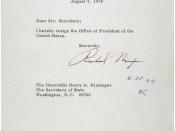As of October 10, 2007, George W. Bush's approval ratings sat at a dismal 36%. Some already say that his presidency is a failure. It may be premature, however, to preemptively judge a president's success or failure. Gerald Ford, who died last year, was eulogized as a "calm and steady hand" who offered healing to a divided nation. In 1974, however, the New York Times lambasted his decision to pardon Richard Nixon as "unwise, divisive, and unjust." Ford's eulogies show that thirty years have given him a weighty situated ethos as the consequences of his actions become clearer in the lens of historical hindsight. But on September 8, 1974, Gerald Ford addressed the nation as a new president that the people had not directly elected. He faced a monumental rhetorical task-to convince a cynical nation that had suffered through two years of Watergate that a full and complete pardon of Nixon was in the best interest of the people.
But, only a month into his presidency, he knew that if he hoped to have any level of ethos with his audience he would have to invent it himself.
Ford rode into the White House on a reputation for honesty and trustworthiness that he had built in the House of Representatives, and carries that reputation for good judgment into the opening paragraphs of his speech. "Ladies and gentlemen," he says, "I have come to a decision," and then lets us know that he is "certain in [his] own mind and . . . conscience that it is the right thing to do." Although the public may not know his reputation, he invokes it nevertheless, since he knows that they are very familiar with the reputations of his predecessors, Spiro Agnew and Richard Nixon. When honest Jerry Ford says his decision is...


